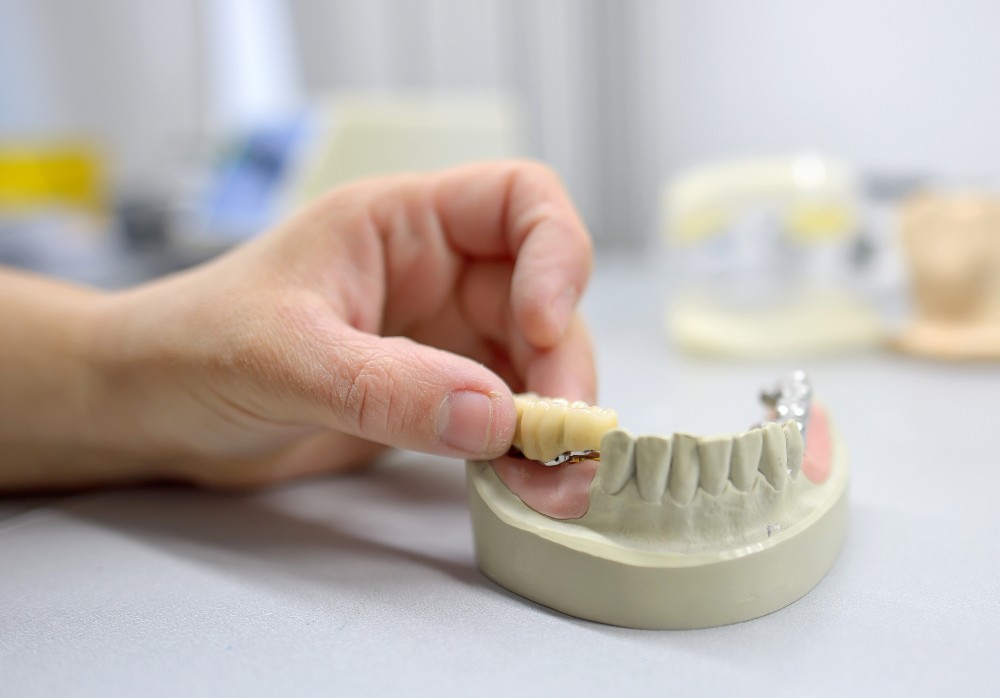We all deal with bad breath from time to time, but it’s usually because we’ve eaten too much garlic or have just woken up and haven’t brushed our teeth yet. That said, if your bad breath is persistent, it may be an indication of an infection or an improperly healed dental prosthetic, such as a dental bridge.
Talk to a dentist in South Edmonton to learn more about the causes of bad breath and how it relates to your dental device.
What are Dental Bridges?
A dental bridge is a form of restorative dentistry. Alongside dental crowns, implants, and dentures, this is a great solution to repair your smile if you’re missing teeth.
This prosthetic is comprised of an artificial tooth that fills in the gap in your smile, and two abutments. These pieces, which are typically 2 dental crowns, attach to your neighboring teeth and keep the entire bridge in place.
Dental bridges are specially made from porcelain or resin so that they seamlessly blend in with the rest of your smile. As a result, after it’s been installed, no one will know that you’ve received dental treatment except you and your dentist.
Would you’d like to learn more about dental bridges in South Edmonton, and whether you’re an ideal candidate to acquire one? Speak with a dentist near you today. They will be able to address all your queries.
Why Do I Have Bad Breath After Treatment?
If you’ve just received a bridge and start to experience chronic bad breath(halitosis), this may be a sign that there is a build up of plaque and bacteria around your new device.
There are a couple of different options that you can explore to address this issue, and they are:
Tip 1: Removing the bridge.
Or, more specifically, replacing the bridge with one that’s brand new and fully clean.
Tip 2: Water flossing.
One of the most prevalent reasons why our breath smells following a dental bridge treatment is because there’s a reasonable buildup of trapped food and other bacteria around it. If you’re having trouble getting rid of these particles by regular brushing and flossing, you may want to try water flossing as an alternative.
Water flossing uses directed jets of water to flush out debris from fissures and grooves that we can’t access.
Tip 3: Have your bridge examined.
If you aren’t sold on fully replacing your dental bridge, it doesn’t hurt to take a trip to your local dental clinic and have it examined. Sometimes, for whatever reason, your crowns or artificial tooth haven’t been placed correctly, or they have come loose, which can invite plaque to amalgamate and, in turn, lead to bad breath.
Let your dentist know what’s happening so they can suggest the best avenue of treatment to help you avoid decay and get your mouth feeling fresh once more.
Tip 4: Your bridge is damaged.
Wear and tear, oral trauma, or a human error that occurred during the installation process are all factors that can cause your bridge to become damaged. This can also lead to an amalgamation of bacteria and tartar. Unfortunately, if your prosthetic is broken, there’s nothing you can do about it –it’s a problem that your dentist will need to fix.
Always be sure to follow any instructions that your dental team gives you when it comes to caring for your restorative device and, by extension, your new smile. Practicing good habits like avoiding foods that are high in sugar, consistent brushing, and coming in for periodic cleanings will all help you now and in the long run.
At Jagare Ridge Dental, we provide dental bridges near you. If you’re dealing with a defective bridge or require further assistance of any kind to get your smile back to normal, we are here to help you in any way we can! Our team looks forward to welcoming you to our clinic.
